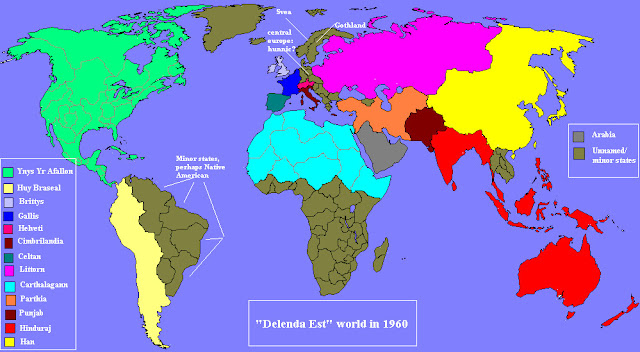"Australasia, Indonesia, Borneo, Burma, eastern India, and a good deal of the Pacific belonged to Hinduraj."
-Poul Anderson, "Delenda Est" IN Anderson, Time Patrol (Riverdale, NY, 2006), pp. 173-228 AT 2, pp. 184-185.
"...the bloody rise of Mahendr Shud-dhikartaa hai - Mahendra the Purifier - carving out a new empire called Hinduraj on the Bay of Bengal..."
-SM Stirling, The Given Sacrifice (New York, 2014), Chapter One, p. 8.
Since "Delenda Est" was originally published in 1955 and since Stirling's Change occurred in 1998, is it possible that Mahendra named his Hinduraj of Change Year 26/2024 AD after Anderson's fictional Hinduraj?
"This...is a very important story because it shows how all the comings and goings between our world and Narnia first began."
-CS Lewis, The Magician's Nephew (London, 1998), Chapter 1, p. 9.
Why do I refer to Narnia immediately after Hinduraj? Well, all three of these countries, Narnia, Hinduraj (Anderson) and Hinduraj (Stirling) exist in other worlds - different kinds of other worlds. The Magician's Nephew is a prequel that begins by proclaiming that it is a prequel. More generally, its reference to "comings and goings" between worlds could equally apply to works by Poul Anderson, SM Stirling and Neil Gaiman. We take for granted the fantastic idea of travel between worlds thanks to the creative imaginations of these and other fantasy authors.

10 comments:
Paul:
Given that "Raj" is Hindustani for "rule" (as a noun, anyway), Hinduraj seems a logical way of expressing "Hindu Empire." There's thus no real evidence in support of Mahendra being a science fiction fan.
David,
Indeed, but the fannish mind makes connectons.
Paul.
I definitely had Poul's story in mind; on the other hand, I was also thinking of the expression "Hindu Raj" from contemporary Hindu-nationalist discourse (Mahendr is a name taken by Dara Singh, a Bajrang Dal militant) and also a time travel story by John Brunner, in which Mahendra the White Elephant is the title of the ruler of a post-Mongol empire in an alternate world.
The Brunner novel is "Times Without Number", and it's excellent. https://www.amazon.co.uk/Times-Without-Number-John-Brunner-ebook/dp/B005OAIFN0/ref=sr_1_2?ie=UTF8&qid=1503554206&sr=8-2&keywords=Times+without+Number+Brunner
Gentlmen,
David, Besides the Hinduraj in Stirling's THE GIVEN SACRIFICE, I also had his Angrezi Raj in his other book THE PESHAWAR LANCERS in mind.
Mr. Stirling, and Paul reminded me as well of Poul Anderson's alternate Hinduraj in "Delenda Est." And I did think of that extreme nationalist Hindu party in India as well.
I have read some of John Brunner's works, and while I liked his "Elixir For The Emperor," I found his STAND ON ZANZIBAR dated and unsatisfactory. Plus, I read his SQUARES OF THE CITY.
Sean
Mr Stirling,
I disliked "Times Without Number" because I found its time travel logic very unsatisfactory.
Paul.
Of Brunner, I've read *Catch a Falling Star* (the climax of which I've cited for awesomeness on this site), *Polymath*, *The Traveler in Black*, and *Interstellar Empire*, which collects three novellas in a common setting — a setting for which Brunner, too, used the term "the Long Night."
I've read bits and pieces of *The Shockwave Rider*, but it didn't grab me enough to read the whole thing.
Paul: that's interesting... what part of the logic? (It's been a while since I read it.)
Mr Stirling,
I would have to reread it - which I don't want to do! (And I am sure I don't have a copy.) From memory: members of the time travel organization knew that someone, let's call him X, had departed into the past intending to change the course of events. They were worried that, after some time had elapsed for them, they would cease to exist! If X initiated a divergent timeline, then it would not affect them in their timeline. If he had prevented then from existing in the first place, then they would not be existing and worrying about it. At the end of the book, our hero is time travelling WHEN the timeline changes. What is the significance of the word "when" in this context? He arrives, I think without his time machine, in the 20th century of our timeline. Why should this happen? If the change of timelines generated our timeline, why did he and no one else arrive in our timeline instead of just remaining in the "deleted" timeline?
Paul.
Also, the discoverer of time travel was quoted as saying that maybe the reason why no time travelers had visited him from the far future was because time travellers would soon delete this timeline. However, the deletion of a timeline is not an event within that timeline. Relationships between timelines have to be in a second temporal dimension. Thus, a deleted timeline could have had a long future within its own temporal dimension.
Post a Comment